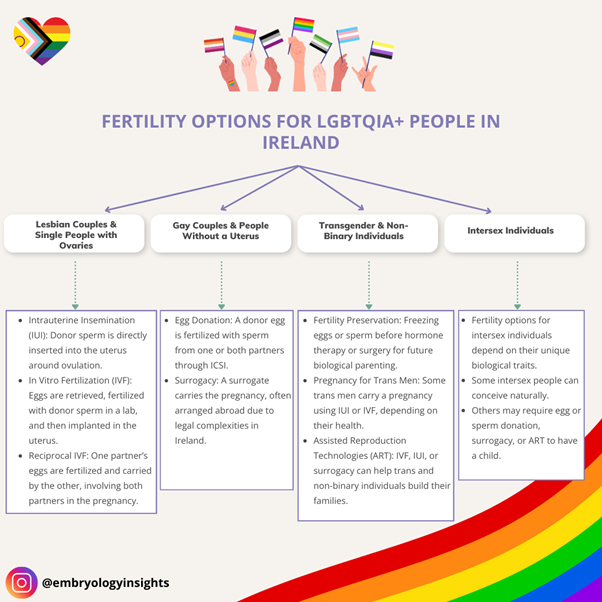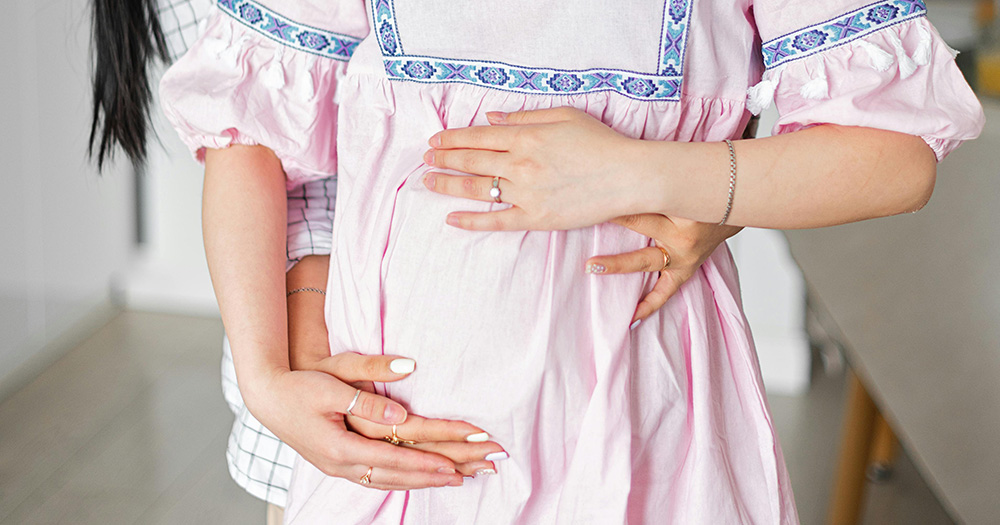As an embryologist and a member of the LGBTQ+ community, I understand firsthand the challenges and barriers our community has faced when it comes to starting a family. For many years, fertility options for LGBTQ+ individuals and couples in Ireland were either unavailable or poorly understood. Thankfully, times are changing, and assisted reproductive technologies (ART) are providing more opportunities than ever before. However, there is still a lot of work to be done to ensure that everyone has access to inclusive, informed, and supportive fertility care.
This article aims to raise awareness and inform LGBTQ+ people in Ireland about their fertility options so that those who wish to become parents can navigate their journey with confidence. By shedding light on available treatments, legal considerations, and support networks, I hope to make fertility care more accessible and inclusive for all.
LGBTQ+ individuals and couples in Ireland can access various fertility treatments, including:
– Donor Sperm or Eggs: Available through Irish fertility clinics from anonymous or known donors.
– IUI (Intrauterine Insemination): Often used by single individuals and lesbian couples.
– IVF (In Vitro Fertilisation): A more complex treatment where fertilisation occurs outside the body.
– Reciprocal IVF: An option for same-sex couples wanting to share both biological and gestational roles.
– Egg or Sperm Freezing: Helps individuals preserve their fertility before medical transition.
– Surrogacy: While Irish surrogacy laws are still evolving, international surrogacy remains an option.
However, the journey to parenthood looks different for each member of the LGBTQ+ community, and fertility options must be tailored to individual needs. Below is an overview of the most common pathways to parenthood in Ireland:
Lesbian couples and single people with ovaries
For those who do not produce sperm, donor sperm is required for conception. Many Irish fertility clinics work with Cryos International and the European Sperm Bank to provide donor options. Common fertility treatments include:
- Intrauterine Insemination (IUI): A straightforward, cost-effective procedure where donor sperm is placed directly into the uterus around ovulation.
- In Vitro Fertilization (IVF): Eggs are retrieved, fertilised with donor sperm in a lab, and then transferred into the uterus.
- Reciprocal IVF: One partner’s eggs are fertilised and carried by the other, allowing both to be involved in the pregnancy.
Gay couples and people without a uterus
For those who do not produce eggs or cannot carry a pregnancy, both egg donation and surrogacy are needed. The process typically involves:
- Egg Donation: A donor egg, from either a known or anonymous donor, is fertilised with sperm from one or both partners through ICSI (Intracytoplasmic Sperm Injection).
- Surrogacy: A surrogate carries the pregnancy. Since surrogacy unfortunately remains legally complex in Ireland, many opt for arrangements abroad, in countries like the United States, Canada, Ukraine, and Greece.
Transgender and non-binary individuals
Fertility options vary depending on medical history, hormone use, and personal circumstances. Some available options include:
- Fertility Preservation: Egg or sperm freezing before hormone therapy or gender-affirming surgery can provide future biological parenting options.
- Pregnancy for Trans Men: Some trans men choose to carry a pregnancy, using IUI or IVF, depending on their reproductive health.
- Assisted Reproduction Technologies (ART): Options such as IVF, IUI, or surrogacy may be used to help trans and non-binary individuals build their families.
Intersex Individuals
Fertility possibilities depend on the specific biological traits of each individual. Some intersex people can conceive naturally, while others may require egg or sperm donation, surrogacy, or ART to have a child.

Fertility options for LGBTQ+ individuals in Ireland are expanding, making parenthood an achievable goal for more people. While challenges still remain, advancements in reproductive medicine and advocacy for inclusive policies are making family-building more accessible for all.
As an embryologist and a proud member of the LGBTQ+ community, I am committed to supporting and guiding individuals on their path to parenthood. Understanding fertility treatments can be overwhelming, but no one should feel alone in the process.
For expert insights on fertility, IVF, and LGBTQ+ family-building, follow me on Instagram (@EmbryologyInsights), where I aim to make fertility treatments more accessible and empower individuals with the knowledge they need to navigate this journey with confidence.
If you have any questions about fertility options or need guidance on where to start, please don’t hesitate to reach out. You can contact me anytime through Instagram or via email at [email protected]. I will do my very best to help and support you on your journey to parenthood.
Everyone deserves the chance to build a family with dignity, respect, and access to the right care.
© 2025 GCN (Gay Community News). All rights reserved.
Support GCN
GCN is a free, vital resource for Ireland’s LGBTQ+ community since 1988.
GCN is a trading name of National LGBT Federation CLG, a registered charity - Charity Number: 20034580.
GCN relies on the generous support of the community and allies to sustain the crucial work that we do. Producing GCN is costly, and, in an industry which has been hugely impacted by rising costs, we need your support to help sustain and grow this vital resource.
Supporting GCN for as little as €1.99 per month will help us continue our work as Ireland’s free, independent LGBTQ+ media.
